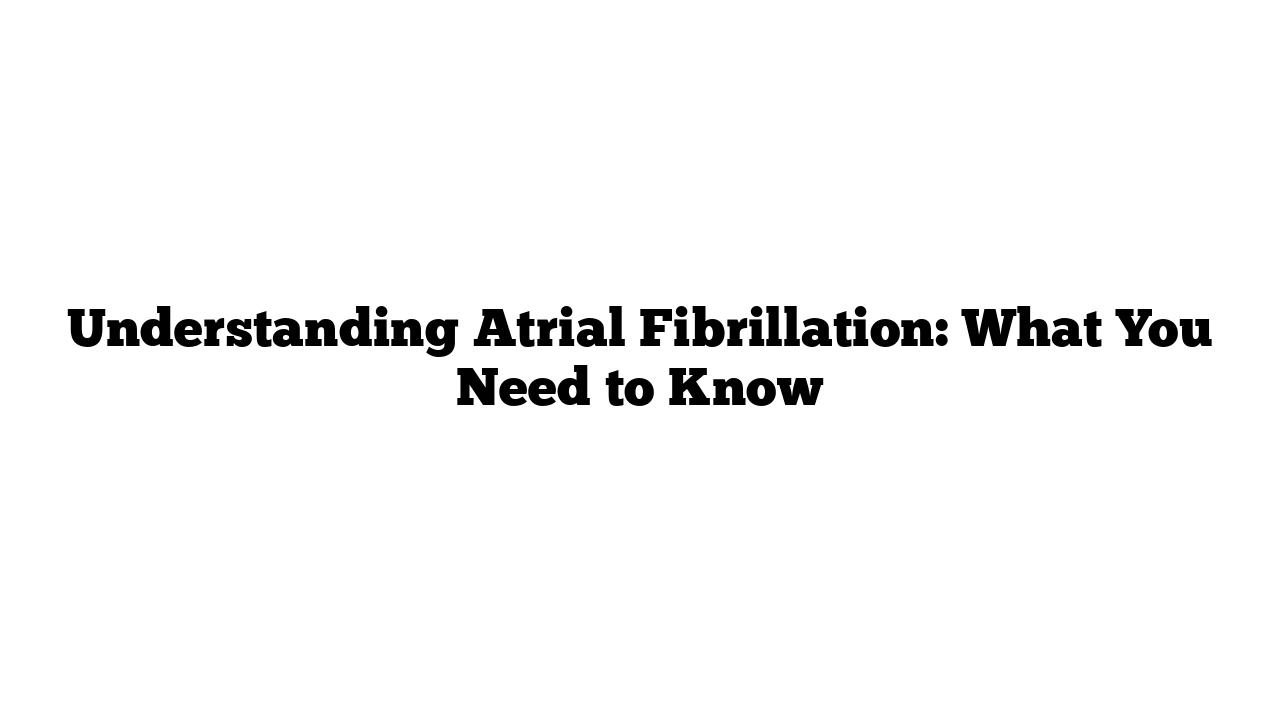What is Atrial Fibrillation?
Atrial fibrillation, often shortened to AFib, is a common heart condition characterized by an irregular and often rapid heartbeat. This irregular heartbeat, known as an arrhythmia, can increase your risk of blood clots, stroke, and other heart-related issues.
During AFib, the heart’s upper chambers (the atria) beat chaotically, out of sync with the lower chambers (the ventricles). For many, AFib doesn’t present any symptoms. However, some individuals may experience a fast or pounding heartbeat, shortness of breath, or light-headedness.
Symptoms of Atrial Fibrillation
Symptoms of AFib can vary from person to person but may include:
- Palpitations: A fast, fluttering, or pounding heartbeat.
- Chest Pain: Discomfort or pain in the chest area.
- Dizziness: A feeling of lightheadedness or faintness.
- Fatigue: Unusual tiredness, even with regular activities.
- Shortness of Breath: Difficulty breathing, especially during physical activity.
- Weakness: A general feeling of weakness or lack of energy.
While some people notice these symptoms, others may not feel anything at all. AFib can be categorized as:
- Occasional (Paroxysmal): Symptoms come and go, lasting from minutes to hours, sometimes even a week.
- Persistent: The irregular heartbeat is constant, requiring medical treatment.
- Long-standing Persistent: Lasting longer than 12 months, often needing medication or procedures to restore a normal rhythm.
- Permanent: The irregular rhythm cannot be reset, necessitating ongoing medication.
When to Seek Help
If you experience any symptoms of AFib, it’s important to schedule a checkup with your healthcare provider. If you have chest pain, don’t hesitate to seek immediate medical attention, as it could indicate a heart attack.
What Causes Atrial Fibrillation?
To understand what causes AFib, it’s essential to know how a healthy heart works. The heart has four chambers: two upper (atria) and two lower (ventricles). The sinus node, located in the right atrium, sends electrical signals that trigger each heartbeat. In AFib, these signals become chaotic, leading to a rapid and irregular heartbeat.
Common causes of AFib include:
- Heart Disease: Such as congenital heart defects, heart valve disease, and coronary artery disease.
- High Blood Pressure: Over time, high blood pressure can stiffen the heart, disrupting normal rhythm.
- Thyroid Issues: An overactive thyroid can contribute to AFib.
- Lung Diseases: Conditions like pneumonia may increase the risk.
- Sleep Apnea: This disorder can lead to AFib episodes.
- Lifestyle Factors: Excessive alcohol, caffeine, tobacco use, and certain medications can trigger AFib.
Risk Factors for Atrial Fibrillation
Several factors can increase your likelihood of developing AFib:
- Age: The risk of AFib rises as you get older.
- Obesity: Being overweight can raise your risk.
- Chronic Health Conditions: Conditions like diabetes, kidney disease, and lung disease are linked to AFib.
- Family History: A family history of heart problems can elevate your risk.
Complications
One of the most serious complications of AFib is the formation of blood clots, which can lead to stroke. The risk of stroke increases with age and is further heightened by conditions such as high blood pressure, diabetes, and heart failure. Doctors often prescribe blood thinners to help prevent these clots.
Prevention
Adopting heart-healthy lifestyle choices can help reduce your risk of developing AFib. Here are some tips:
- Manage Health Conditions: Control high blood pressure, cholesterol, and diabetes.
- Avoid Tobacco: Don’t smoke or use tobacco products.
- Eat a Balanced Diet: Focus on low-sodium, low-saturated fat meals.
- Stay Active: Aim for at least 30 minutes of exercise most days of the week.
- Prioritize Sleep: Adults should aim for 7 to 9 hours of sleep each night.
- Maintain a Healthy Weight: Keep your weight in check.
- Manage Stress: Find effective ways to reduce and handle stress.
